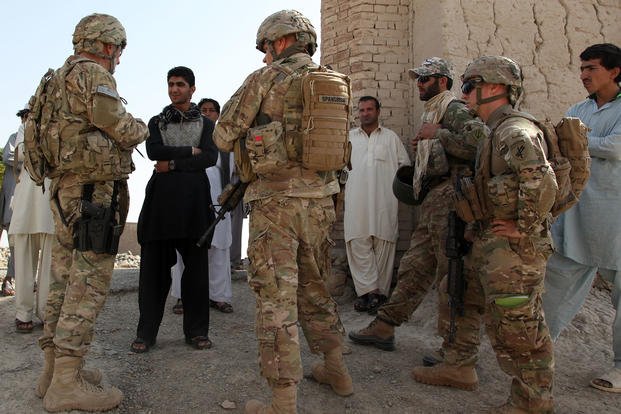Step 2: Decide if you're ready
Army Missions
The Army's core values are:
- Loyalty
- Duty
- Respect
- Selfless service
- Honor
- Integrity
- Personal courage
But beyond these values, what do people actually DO in the Army?
The Army is perhaps the world's largest and most successful team! The Army's missions are vast and varied. It is impossible to sum them up in one comprehensive list, but here are a few of the missions the Army might cover:
- Base security
- Engaging enemy targets on the ground
- Helicopter missions to drop troops in hard-to-reach areas
- Counter drug operations
- Law enforcement in volatile areas
- Large-scale transportation of supplies and troops via ground vehicles
- Humanitarian missions delivering food supplies, building schools, etc.
Below are a few examples of Army people and their missions:
Special forces medic continues to serve as Army doctor, officer
April 16, 2004
Capt. (Dr.) Dan Godbee went through basic training at Fort Leonard Wood, Missouri, as well as the Special Forces Qualification Course at Fort Bragg, N.C. After graduation, the newly minted Green Beret went off to the 5th Special Forces Group and learned the art of unconventional warfare during his first Southwest Asia deployment.
After his first enlistment, Godbee changed over to a Special Forces medic, and it became his first brush with becoming a doctor. Godbee left active duty in 1983 but continued to serve his country in the Army Reserve as a member of the 11th Special Forces. At the same time, he went back to school to become a medical doctor.
When his Reserve unit deployed with the Stryker Brigade Combat Team to Samarra, Iraq, Godbee volunteered his time in the troop medical clinic to help treat soldiers. After the brigade transferred to Mosul, his work has changed to helping citizens in northern Iraq have better medical care.
Humanitarian and reconstruction efforts expand in Afghanistan
March 26, 2004
KHOWST, Afghanistan -- Blue skies and fair winds heralded the grand opening of the newest Provincial Reconstruction Team here.
PRTs lead the way in rebuilding and developing, working closely with provincial governors, local officials, Afghan government ministers, the United Nations and other international agencies. They are set up to operate in remote areas, creating a safer climate to encourage other non-governmental organizations to bring in their services.
Through the PRTs, local laborers are hired for projects such as repaving roads, rebuilding bridges, repairing schools and clinics, and well drilling.
The Khowst PRT features a health clinic that has served more than 9,300 patients -- including 6,000 women -- since it opened in November, according to Capt. Stephen R. Travis. On the morning of the ceremony, Travis saw 130 patients.
Along with the clinic, construction is in the works on a local-use well, and a mosque next door is being renovated.
Rangers get jungle training to help prepare for exercises
April 10, 1998
FORT SHERMAN, Panama -- Soldiers from 3rd Battalion, 75th Ranger Regiment finished their first week of training consisting of a series of jungle training classes to prepare them for their upcoming field training exercises.
The classes included mines and booby traps, waterborne operations; squad react-to-contacts, jungle living and land navigation.
"The classes gave the ranger combat effectiveness for him and the unit," said Sgt. 1st Class Kenneth Wolfe, Jungle Operations Training Center instructor at one of the react to contact training sites.
After one AAR, Wolfe said there's something special about working with rangers.
"They're at a higher level of training compared to other light infantry units," he said. "Being that I spent time in the regiment, I know their whole life is centered around training.
"We're out there doing raids, ambushes, movement to contacts, running patrol bases and moving from here to there. It's good learning for everyone -- especially the younger guys who still need to go to Ranger School."
Military provides medical care hurricane victims need
November 13, 1998
SOTO CANO AIR BASE, Honduras -- Hurricane Mitch took the lives and homes of many people in Honduras, Nicaragua, El Salvador and Guatemala. Medical attention is just one of many relief efforts the U.S. military are providing.
"Our mission is to deliver as much acute care as possible to the people of Honduras who were hit by the hurricane," said Air Force Capt. Mark Luff, a family practice doctor with the 24th Medical Group, Howard Air Base, Panama. "We go to different villages every day, leaving in the morning around 6 a.m. and returning around 7 p.m."
Although the service members are doing their best to help people get back on their feet, the language difference poses a challenge.
When body movements aren't enough, interpreters bridge the gap.
"I love it," said Spc. Maria Mejia, a medic, acting as an interpreter with the Medical Element. "I'm glad to help the people. They're desperate for assistance, and I'm willing to do whatever I can."
Interested in Joining the Military?
We can put you in touch with recruiters from the different military branches. Learn about the benefits of serving your country, paying for school, military career paths, and more: sign up now and hear from a recruiter near you.















